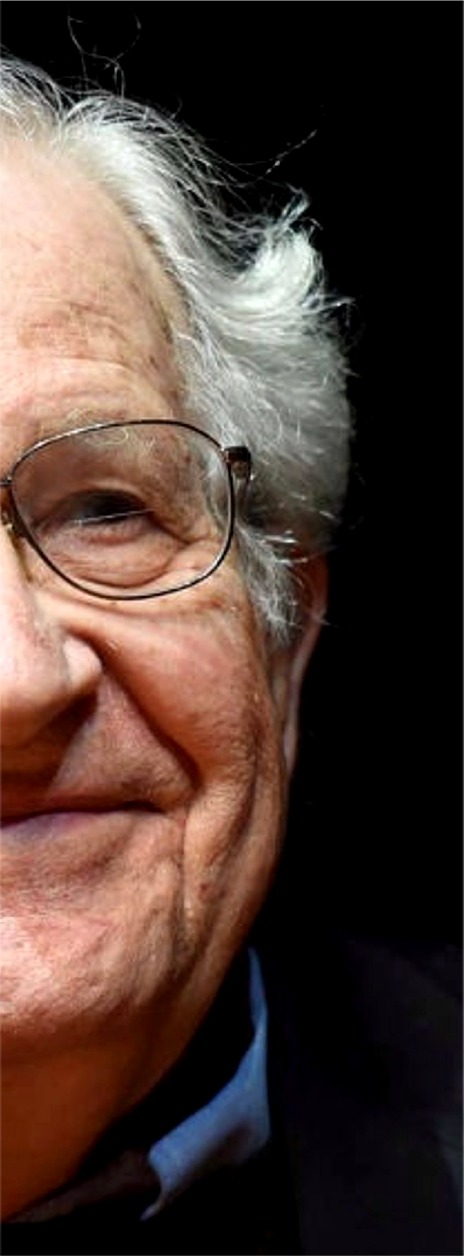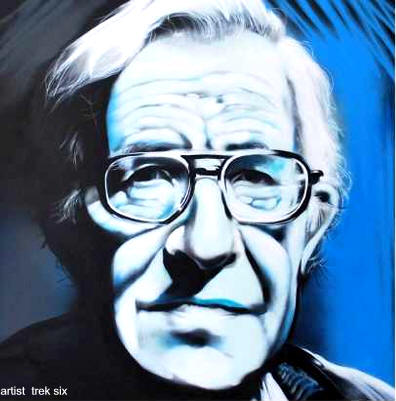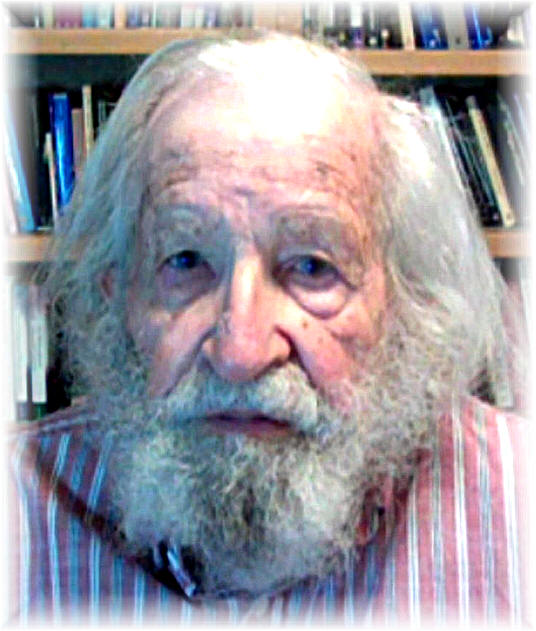|
NOAM AVRAM CHOMSKY
chomsky welcome chomsky 1 chomsky 2 chomsky 3
If there was an observer on Mars they would probably be amazed that we have survived this long
Avram Noam Chomsky Philadelphia, 7
dicembre 1928 - è uno scienziato e teorico della comunicazione statunitense.
Professore emerito di linguistica al Massachusetts Institute of Technology è
riconosciuto come il fondatore della grammatica generativo-trasformazionale,
spesso indicata come il più rilevante contributo alla linguistica teorica del XX
secolo.
muore la moglie di Noam Chomsky
Né à Philadelphie (Pennsylvanie) le 7 décembre 1928,
Chomsky est un linguiste éminent, auteur et philosophe politique radical de
réputation internationale. Il est "Institute Professor" et professeur de
linguistique au Massachusetts Institute of Technology (MIT), membre de l'Académie
américaine des arts et des sciences, membre de l'Académie nationale des sciences,
et il s'est vu décerner dix grades honorifiques d'universités de par le monde.
En 1988, le Japon lui remettait le Prix des sciences fondamentales de Kyoto qui,
du point de vue de son prestige et de sa valeur monétaire (350 000 $)
s'apparente au Prix No L'étendue et la profondeur des écrits de Chomsky témoignent du cercle de ses idées, qui embrassent des sujets aussi variés que la guerre et la paix à l'échelle planétaire, ou la complexité de l'intelligence et de la créativité humaines. Il est l'auteur de plus de 30 livres et d'une multitude d'articles. La bibliographie de ses écrits (la troisième à ce jour - sous couverture cartonnée) contient plus de 700 notices ; plus de la moitié de ses oeuvres portent sur des questions politiques. Dans le domaine des arts, des humanités et des sciences sociales, Chomsky est l'auteur vivant le plus souvent cité. POWER AND TERROR, le dernier état de pensée de Noam Chomsky, à travers une longue interview et une série de conférences à New York et en Californie au printemps 2002. Comme il le fait depuis le 11 septembre, il replace l’ attaque terroriste dans le contexte des interventions américaines depuis 45 - Vietnam, Amérique centrale, Moyen Orient, et ailleurs. Le terrorisme, c’est l’exercice de la violence contre les populations civiles, qu’elle vienne des organisations extrémistes islamiques ou de l’état le plus puissant du monde. En s’appuyant sur ce principe fondamental, Noam Chomsky défie ouvertement les Etats-Unis d’appliquer à leurs propres actions les critères moraux qu’ils exigent et veulent imposer aux autres nations. k-films.com
A CORPORATE WATCH INTERVIEW WITH NOAM CHOMSKY
Corporate Watch's Anna Couey and
Joshua Karliner caught up with Noam Chomsky by telephone at his home in the CW: So our first question is, how significant do you see the recent skirmishes between the Department of Justice and Microsoft? Do you see it as an important turn of events? NC: There's some significance. We shouldn't exaggerate it. If there are three major corporations controlling what is essentially public property and a public creation, namely the Internet, telecommunications, and so on, that's not a whole lot better than one corporation controlling, but it's maybe a minor difference. The question is to what extent parasites like Microsoft should be parasites off the public system, or should be granted any rights at all. CW: Give us a little bit of historical context. How does what's happening with Microsoft's growing power, and its role in society fit into the history of U.S. Corporate power, the evolution of corporations? NC: Here's a brief history, a thumbnail sketch. There were corporations as far back as the 18th century, and beyond. In the United States, corporations were public bodies. Basically, they were associations. A bunch of people could get together and say we want to build a bridge over this river, and could get a state charter which allowed them to do that, precisely that and nothing more. The corporation had no rights of individual persons. The model for the corporation back at the time of the framing of the Constitution was a municipality. Through the 19th century, that began to change. It's important to remember that the constitutional system was not designed in the first place to defend the rights of people. Rather, the rights of people had to be balanced, as Madison put it, against what he called "the rights of property." Well of course, property has no rights: my pen has no rights. Maybe I have a right to it, but the pen has no rights. So, this is just a code phrase for the rights of people with property. The constitutional system was founded on the principle that the rights of people with property have to be privileged; they have rights because they're people, but they also have special rights because they have property. As Madison put it in the constitutional debates, the goal of government must be "to protect the minority of the opulent against the majority." That's the way the system was set up. In the United States, around the turn of the century, through radical judicial activism, the courts changed crucially the concept of the corporation. They simply redefined them so as to grant not only privileges to property owners, but also to what legal historians call "collectivist legal entities." Corporations, in other words, were granted early in this century the rights of persons, in fact, immortal persons, and persons of immense power. And they were freed from the need to restrict themselves to the grants of state charters. That's a very big change. It's essentially establishing major private tyrannies, which are furthermore unaccountable, because they're protected by First Amendment rights, freedom from search and seizure and so on, so you can't figure out what they're doing. After the Second World War, it was well understood in the business world that they were going to have to have state coordination, subsidy, and a kind of socialization of costs and risks. The only question was how to do that. The method that was hit upon pretty quickly was the "Pentagon system" (including the DOE, AEC, NASA). These publicly-subsidized systems have been the core of the dynamic sectors of the American economy ever since (much the same is true of biotechnology, pharmaceuticals, etc., relying on different public sources). And that certainly leads right to Microsoft. So how does Microsoft achieve its enormous profits? Well, Bill Gates is pretty frank about it. He says they do it by "embracing and extending" the ideas of others. They're based on computers, for example. Computers were created at public expense and public initiative. In the 1950s when they were being developed, it was about 100% public expense. The same is true of the Internet. The ideas, the initiatives, the software, the hardware -- these were created for about 30 years at public initiative and expense, and it's just now being handed over to guys like Bill Gates. CW: What are the social and cultural impacts of allowing, not only a monopoly, but even if it's just a few large corporations, dominating something as basic as human speech, communication with each other? NC: It's a form of tyranny. But, that's the whole point of corporatization -- to try to remove the public from making decisions over their own fate, to limit the public arena, to control opinion, to make sure that the fundamental decisions that determine how the world is going to be run -- which includes production, commerce, distribution, thought, social policy, foreign policy, everything -- are not in the hands of the public, but rather in the hands of highly concentrated private power. In effect, tyranny unaccountable to the public. And there are various modalities for doing this. One is to have the communication system, the so-called information system, in the hands of a network of, fewer or more doesn't matter that much, private tyrannies. Let's take the media in the United States. These are corporate media, overwhelmingly. Even the so-called public media are not very different. They are just huge corporations that sell audiences to advertisers in other businesses. And they're supposed to constitute the communications system. It's not complicated to figure out what's going to come out of this. That includes also the entertainment industries, so-called, the various modalities for diverting people from the public arena, and so on. And there are new things happening all the time. Like right at this minute, there's a dramatic example, that's the Multilateral Agreement on Investment (MAI), which is supposed to be signed this month, but they're not going to make it. The negotiations have been going on in secret for about three years. It's essentially a huge corporate power play, trying to give "investors" -- that doesn't mean the guy working on the shop floor, it means the board of directors of GE, of Merrill Lynch, and so on -- to give investors extraordinary rights. That's being done in secret because the people involved, which is the whole business community incidentally, know that the public is going to hate it. So therefore the media are keeping it secret. And it's an astonishing feat for three years to keep quiet about what everyone knows to be a major set of decisions, which are going to lock countries into certain arrangements. It'll prevent public policy. Now you can argue that it's a good thing, a bad thing, you can argue what you like, but there's no doubt about how the public is going to react, and there's no doubt about the fact that the media, which have been well aware of this from the beginning have succeeded in virtually not mentioning it. CW: How would a company like Microsoft benefit from the MAI? NC: They could move capital freely. They could invest it where they like. There would be no restrictions on anything they do. A country, or a town, like say, Cambridge, Massachusetts, where I live, where I work, could not impose conditions on consumer protection, environmental control, investment and set-asides for minorities or women, you name it, that would be ruled out. Now exactly how far this would go depends on the disposition to enforce it. These things are not determined by words. There's nothing in the Constitution, or the amendments to the Constitution, which allows private tyrannies to have the right to personhood. It's just power, not the wording. What the MAI would mean in practice depends on what the power relations are, like whether people object to it so strenuously they won't allow it to happen, maybe by riots, or whatever. So those are the terms that they're going to try to impose. A crucial element of this is what they call the ratchet effect; that is existing legislation is to be allowed, but it has to be removed over time. It has to be rolled back, and no new legislation can be introduced conflicting with the rights of Microsoft to do anything they like in the international arena, or domestically. Well over time that's supposed to have a ratchet effect, to turn the world over more and more in the hands of the major private tyrannies, like Microsoft, with their alliances and interactions. CW: Economist Brian Arthur argues that with the rapidly changing nature of technology, no one will remain in a monopoly position for long, so that monopoly power in the technology industries is different than what we've historically seen, and is nothing to worry about. NC: But there never was monopoly power; or there very rarely was monopoly power. Take highly concentrated power systems, like the energy industries. But they're not strictly speaking monopolies. Shell and Exxon are competitors. This is a highly managed system of market administration, with enormous state power entering in the interests of a small collection of private tyrannies. It's very rare to find a real monopoly. AT&T was a monopoly for a time, that's why it could create things like the transistor, for example. It was a monopoly, so therefore they could charge high rates. But that's certainly unusual. CW: Do you think the whole monopoly issue is something to be concerned about? NC: These are oligopolies; they are small groups of highly concentrated power systems which are integrated with one another. If one of them were to get total control of some system, other powers probably wouldn't allow it. In fact, that's what you're seeing. CW: So, you don't think Bill Gates is a latter-day John D. Rockefeller? NC: John D. Rockefeller wasn't a monopolist. Standard Oil didn't run the whole industry; they tried. But other power centers simply don't want to allow that amount of power to one of them.
CW:
Then in fact, maybe there is a parallel
there between Gates and Rockefeller, or not?
It is indeed unlikely that any pure monopoly could be sustained. Remember that this changing technology that they're talking about is overwhelmingly technology that's developed at public initiative and public expense. Like the Internet after all, 30 years of development by the public then handed over to private power. That's market capitalism. CW: How has that transfer from the public to the private sphere changed the Internet? NC: As long as the Internet was under control of the Pentagon, it was free. People could use it freely [for] information sharing. That remained true when it stayed within the state sector of the National Science Foundation. As late as about 1994, people like say, Bill Gates, had no interest in the Internet. He wouldn't even go to conferences about it, because he didn't see a way to make a profit from it. Now it's being handed over to private corporations, and they tell you pretty much what they want to do. They want to take large parts of the Internet and cut it out of the public domain altogether, turn it into intranets, which are fenced off with firewalls, and used simply for internal corporate operations. They want to control access, and that's a large part of Microsoft's efforts: control access in such a way that people who access the Internet will be guided to things that *they* want, like home marketing service, or diversion, or something or other. If you really know exactly what you want to find, and have enough information and energy, you may be able to find what you want. But they want to make that as difficult as possible. And that's perfectly natural. If you were on the board of directors of Microsoft, sure, that's what you'd try to do. Well, you know, these things don't *have* to happen. The public institution created a public entity which can be kept under public control. But that's going to mean a lot of hard work at every level, from Congress down to local organizations, unions, other citizens' groups which will struggle against it in all the usual ways. CW: What would it look like if it were under public control? NC: It would look like it did before, except much more accessible because more people would have access to it. And with no constraints. People could just use it freely. That has been done, as long as it was in the public domain. It wasn't perfect, but it had more or less the right kind of structure. That's what Microsoft and others want to destroy. CW: And when you say that, you're referring to the Internet as it was 15 years ago. NC: We're specifically talking about the Internet. But more generally the media has for most of this century, and increasingly in recent years, been under corporate power. But that's not always been the case. It doesn't have to be the case. We don't have to go back very far to find differences. As recently as the 1950s, there were about 800 labor newspapers reaching 20-30 million people a week, with a very different point of view. You go back further, the community-based and labor-based and other media were basically on par with the corporate media early in this century. These are not laws of nature, they're just the results of high concentration of power granted by the state through judicial activism and other private pressure, which can be reversed and overcome. CW: So take the increasing concentration in the technology that we're looking at with Microsoft and some of these other companies, and compare it with recent mergers in the defense, media, insurance, and banking industries, and especially the context of globalization. Are we looking at a new stage in global capitalism, or is this just a continuation of business as usual? NC: By gross measures, contemporary globalization is bringing the world back to what it was about a century ago. In the early part of the century, under basically British domination and the gold standard, if you look at the amount of trade, and then the financial flow, and so on, relative to the size of the economy, we're pretty much returning to that now, after a decline between the two World Wars. Now there are some differences. For example, the speed of financial transactions has been much enhanced in the last 25 years through the so-called telecommunications revolution, which was a revolution largely within the state sector. Most of the system was designed, developed, and maintained at public expense, then handed over to private profit. State actions also broke down the post-war international economic system, the Bretton Woods system in the early 1970s. It was dismantled by Richard Nixon, with US and British initiative primarily. The system of regulation of capital flows was dismantled, and that, along with the state-initiated telecommunications revolution led to an enormous explosion of speculative capital flow, which is now well over a trillion dollars a day, and is mostly non-productive. If you go back to around 1970, international capital flows were about 90% related to the real economy, like trade and investment. By now, at most a few percent are related to the real economy. Most have to do with financial manipulations, speculations against currencies, things which are really destructive to the economy. And that is a change that wasn't true, not only wasn't true 100 years ago, it wasn't true 40 years ago. So there are changes. And you can see their effects.
That's surely part of the reason
for the fact that the recent period, the last 25 years, has been a period of
unusually slow economic growth, of low productivity growth, of stagnation or
decline of wages and incomes for probably two thirds of the population, even in
a rich country like this. And enormously high profits for a very small part of
the population. And it's worse in the Third World.
You can read in the New York Times, the lead article in the "Week in Review" yesterday, Sunday, April 12, that America is prospering and happy. And you look at the Americans they're talking about, it turns out it's not the roughly two thirds of the population whose incomes are stagnating or declining, it's the people who own stock. So, ok, they're undoubtedly doing great, except that about 1% of households have about 50% of the stock, and it's roughly the same with other assets. Most of the rest is owned by the top 10% of the population. So sure, America is happy, and America is prosperous, if America means what the New York Times means by it. They're the narrow set of elites that they speak for and to. CW: We are curious about this potential for many-to-many communications, and the fact that software, as a way of doing things carries cultural values, and impacts language and perception. And what kind of impacts there are around having technology being developed by corporations such as Microsoft. NC: I don't think there's really any answer to that. It depends who's participating, who's active, who's influencing the direction of things, and so on. If it's being influenced and controlled by the Disney Corporation and others it will reflect their interests. If there is largely public initiative, then it will reflect public interests. CW: So it gets back to the question of taking it back. NC: That's the question. Ultimately it's a question of whether democracy's going to be allowed to exist, and to what extent. And it's entirely natural that the business world, along with the state, which they largely dominate, would want to limit democracy. It threatens them. It always has been threatening. That's why we have a huge public relations industry dedicated to, as they put it, controlling the public mind. CW: What kinds of things can people do to try to expand and reclaim democracy and the public space from corporations? NC: Well, the first thing they have to do is find out what's happening to them. So if you have none of that information, you can't do much. For example, it's impossible to oppose, say, the Multilateral Agreement on Investment, if you don't know it exists. That's the point of the secrecy. You can't oppose the specific form of globalization that's taking place, unless you understand it. You'd have to not only read the headlines which say market economy's triumphed, but you also have to read Alan Greenspan, the head of the Federal Reserve, when he's talking internally; when he says, look the health of the economy depends on a wonderful achievement that we've brought about, namely "worker insecurity." That's his term. Worker insecurity--that is not knowing if you're going to have a job tomorrow. It is a great boon for the health of the economy because it keeps wages down. It's great: it keeps profits up and wages down. Well, unless people know those things, they can't do much about them. So the first thing that has to be done is to create for ourselves, for the population, systems of interchange, interaction, and so on. Like Corporate Watch, Public Citizen, other popular groupings, which provide to the public the kinds of information and understanding, that they won't otherwise have. After that they have to struggle against it, in lots of ways which are open to them. It can be done right through pressure on Congress, or demonstrations, or creation of alternative institutions. And it should aim, in my opinion, not just at narrow questions, like preventing monopoly, but also at deeper questions, like why do private tyrannies have rights altogether? CW: What do you think about the potential of all the alternative media that's burgeoning on the Internet, given the current trends? NC: That's a matter for action, not for speculation. It's like asking 40 years ago what's the likelihood that we'd have a minimal health care system like Medicare? These things happen if people struggle for them. The business world, Microsoft, they're highly class conscious. They're basically vulgar marxists, who see themselves engaged in a bitter class struggle. Of course they're always going to be at it. The question is whether they have that field to themselves. And the deeper question is whether they should be allowed to participate; I don't think they should. corpwatch.radicaldesigns.org/article.php?id=1408
* Il principio della rana bollita
Immaginate un pentolone pieno d’acqua fredda nel quale nuota tranquillamente una
rana. .
Il principio della rana bollita utilizzato dal filosofo americano Noam Chomsky, fa riferimento alla Società ai Popoli che accettando passivamente il degrado, le vessazioni la scomparsa dei valori dell'etica e ne accettano di fatto la deriva
https://youtu.be/Y3clncyJ4b0
- principio rana bollita https://youtu.be/Axdrh9F3Kqo - anthropocene period and its challenges https://youtu.be/KwTQsvhq3ew - best speech in 2018 L’emergenza coronavirus è grave ma la supereremo ciò che mi preoccupa sono altre crisi dell’umanità
la guerra nucleare
e il riscaldamento globale .
Ci troviamo in un momento
critico della storia umana e non solo a causa del
coronavirus
.
Questo dovrebbe portarci alla consapevolezza dei profondi difetti
del mondo, delle profonde e disfunzionali caratteristiche
dell’intero sistema socio-economico, che deve cambiare se vogliamo
sopravvivere nel futuro . Quindi questo
potrebbe essere un segnale d’allarme e una lezione per affrontarlo
oggi o per evitare che esploda . Ma è necessario
pensare alle sue radici e a come queste radici porteranno ad altre
crisi, peggiori di questa . *
everybody's worried about stopping terrorism well there's a really easy way stop participating in it
*
WE CAN BE FAIRLY CONFIDENT
fb/nc - 2014
*
I get terrific health
care Health-care system is largely privatized and unregulated
So of course it's highly
inefficient and costly *
1- La strategia della distrazione
.
.
| ||||||||||||||||||||||||||||||||||||||||

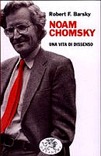
 bel. Les parents de Chomsky, juifs de petite bourgeoisie,
enseignent à l'école hébraïque. Ils l'inscrivent avant l'âge de deux ans dans
une école progressiste expérimentale, où il reste jusqu'à douze ans. Il y
apprend "que tout le monde fait quelque chose d'important". Il se souvient d'une
enfance absorbée dans la lecture, il se revoit pelotonné sur un sofa lisant les
livres qu'il emprunte à la douzaine à la bibliothèque. N'ayant connu à l'école
ni la compétition ni le classement par rapport aux autres, il doit attendre d'être
à l'école secondaire pour apprendre qu'il est bon élève. Ses années à l'école secondaire sont des années
d'intense compétition et d'enrégimentation ; elles demeurent "une période
presque complètement sortie de [sa] mémoire, sauf sur le plan affectif où,
dit-il, le bilan est plutôt négatif". Dans le New York des années 30, en vertu d'un
programme d'aide aux personnes handicapées, on a confié à l'oncle de Chomsky,
qui est bossu, un kiosque à journaux derrière la sortie de la station de métro
de la 72e Rue et de Broadway. Le kiosque, qui ne rapporte rien, est un salon où
circulent les idées radicales, où le jeune Noam peut travailler le soir et
prendre part à ces riches échanges intellectuels. "C'est là que j'ai fait mon
éducation politique", de déclarer Chomsky. Le premier article de Chomsky, écrit quelques semaines
après son dixième anniversaire, est un éditorial sur la chute de Barcelone, qui
paraît dans le journal scolaire Chomsky fréquente l'Université de Pennsylvanie, vit
chez ses parents et enseigne l'hébreu pour payer ses études. Il rencontre à l'université
Zelig Harris, qui deviendra son mentor. C'était un homme aux intérêts
extrêmement variés, une personne, au dire de Chomsky "supérieurement brillante
et originale", qui se trouvait être à l'époque un des chefs de file de la
linguistique moderne. En 1955, il termine son doctorat à l'Université de
Pennsylvanie, pour lequel il dépose un des chapitres de son ouvrage The Logical
Structure of Linguistic Theory. L'importance de ce travail ne se révèle pas dès
l'abord, puisqu'il faut attendre vingt ans avant que l'ouvrage soit publié. Quand Chomsky se lance en linguistique, il rejette
toutes les théories alors en vigueur. Ses recherches dans le domaine des
structures innées du langage et de la grammaire générative devaient complètement
révolutionner la linguistique et influencer profondément des disciplines telles
que la psychologie, l'intelligence artificielle, et d'autres.
bel. Les parents de Chomsky, juifs de petite bourgeoisie,
enseignent à l'école hébraïque. Ils l'inscrivent avant l'âge de deux ans dans
une école progressiste expérimentale, où il reste jusqu'à douze ans. Il y
apprend "que tout le monde fait quelque chose d'important". Il se souvient d'une
enfance absorbée dans la lecture, il se revoit pelotonné sur un sofa lisant les
livres qu'il emprunte à la douzaine à la bibliothèque. N'ayant connu à l'école
ni la compétition ni le classement par rapport aux autres, il doit attendre d'être
à l'école secondaire pour apprendre qu'il est bon élève. Ses années à l'école secondaire sont des années
d'intense compétition et d'enrégimentation ; elles demeurent "une période
presque complètement sortie de [sa] mémoire, sauf sur le plan affectif où,
dit-il, le bilan est plutôt négatif". Dans le New York des années 30, en vertu d'un
programme d'aide aux personnes handicapées, on a confié à l'oncle de Chomsky,
qui est bossu, un kiosque à journaux derrière la sortie de la station de métro
de la 72e Rue et de Broadway. Le kiosque, qui ne rapporte rien, est un salon où
circulent les idées radicales, où le jeune Noam peut travailler le soir et
prendre part à ces riches échanges intellectuels. "C'est là que j'ai fait mon
éducation politique", de déclarer Chomsky. Le premier article de Chomsky, écrit quelques semaines
après son dixième anniversaire, est un éditorial sur la chute de Barcelone, qui
paraît dans le journal scolaire Chomsky fréquente l'Université de Pennsylvanie, vit
chez ses parents et enseigne l'hébreu pour payer ses études. Il rencontre à l'université
Zelig Harris, qui deviendra son mentor. C'était un homme aux intérêts
extrêmement variés, une personne, au dire de Chomsky "supérieurement brillante
et originale", qui se trouvait être à l'époque un des chefs de file de la
linguistique moderne. En 1955, il termine son doctorat à l'Université de
Pennsylvanie, pour lequel il dépose un des chapitres de son ouvrage The Logical
Structure of Linguistic Theory. L'importance de ce travail ne se révèle pas dès
l'abord, puisqu'il faut attendre vingt ans avant que l'ouvrage soit publié. Quand Chomsky se lance en linguistique, il rejette
toutes les théories alors en vigueur. Ses recherches dans le domaine des
structures innées du langage et de la grammaire générative devaient complètement
révolutionner la linguistique et influencer profondément des disciplines telles
que la psychologie, l'intelligence artificielle, et d'autres.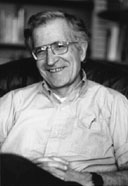 Boston area to ask him about Microsoft and Bill Gates. The following is a
transcript of our far ranging conversation.
Boston area to ask him about Microsoft and Bill Gates. The following is a
transcript of our far ranging conversation.